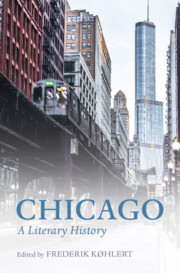Book contents
- Chicago: A Literary History
- Chicago
- Copyright page
- Contents
- Figures
- Contributors
- Acknowledgments
- Introduction: The Literary History of Chicago
- Part I The Rise of Chicago and the Literary West
- Part II Business Unusual: A New Urban American Literature
- Part III Radicalism, Modernism, and the Chicago Renaissance
- Part IV A City of Neighborhoods: The Great Depression, Sociology, and the Black Chicago Renaissance
- Part V Traditions and Futures: Contemporary Chicago Literatures
- Chapter 23 Division Street America: The Nine Chicago Literary Lives of Studs Terkel
- Chapter 24 Sexual and Other Perversities: David Mamet and Contemporary Chicago Theater
- Chapter 25 Chicago Crime, Blue Collar and White: Sara Paretsky’s V. I. Warshawski Novels
- Chapter 26 Drawing Chicago: Chris Ware’s Graphic City
- Chapter 27 Across Neighborhood and National Boundaries: Ana Castillo, Sandra Cisneros, and Mexican Chicago
- Chapter 28 Stuart Dybek and the New Chicago’s Literature of Neighborhood
- Chapter 29 Chicago Now: Aleksandar Hemon, Dmitry Samarov, Erika L. Sánchez, and the Contemporary City of Immigrants
- Chapter 30 Afterword: What Will Become of Us? The Future of Chicago Literatures
- Selected Bibliography
- Index
Chapter 30 - Afterword: What Will Become of Us? The Future of Chicago Literatures
from Part V - Traditions and Futures: Contemporary Chicago Literatures
Published online by Cambridge University Press: 02 September 2021
- Chicago: A Literary History
- Chicago
- Copyright page
- Contents
- Figures
- Contributors
- Acknowledgments
- Introduction: The Literary History of Chicago
- Part I The Rise of Chicago and the Literary West
- Part II Business Unusual: A New Urban American Literature
- Part III Radicalism, Modernism, and the Chicago Renaissance
- Part IV A City of Neighborhoods: The Great Depression, Sociology, and the Black Chicago Renaissance
- Part V Traditions and Futures: Contemporary Chicago Literatures
- Chapter 23 Division Street America: The Nine Chicago Literary Lives of Studs Terkel
- Chapter 24 Sexual and Other Perversities: David Mamet and Contemporary Chicago Theater
- Chapter 25 Chicago Crime, Blue Collar and White: Sara Paretsky’s V. I. Warshawski Novels
- Chapter 26 Drawing Chicago: Chris Ware’s Graphic City
- Chapter 27 Across Neighborhood and National Boundaries: Ana Castillo, Sandra Cisneros, and Mexican Chicago
- Chapter 28 Stuart Dybek and the New Chicago’s Literature of Neighborhood
- Chapter 29 Chicago Now: Aleksandar Hemon, Dmitry Samarov, Erika L. Sánchez, and the Contemporary City of Immigrants
- Chapter 30 Afterword: What Will Become of Us? The Future of Chicago Literatures
- Selected Bibliography
- Index
Summary
The future of Chicago literature will emerge from the city’s “literary infrastructure.” Just as the city’s literal infrastructures channel the movement of water and waste, electricity and gas, vehicles and people, literary institutions (publishers, bookstores, libraries, schools, museums, newspapers, performance venues) enable the flow of creative energies. From the late nineteenth century onwards, Chicago, as a new sort of industrial city, challenged writers with social and physical realities that seemed beyond (or below) conventional literary expression. Writers responded by innovating in style and genre, shifting the literary standards to represent how Chicago shaped, and was shaped by, its people. Many contemporary Chicago writers work across genres and in media as diverse as sociological scholarship and comic books; others write poetry and novels, while also functioning as part of the literary infrastructure as reviewers, publishers, and professors. Future Chicago literature will be written by native Chicagoans and newcomers alike, as they encounter the city, engage with its literary traditions, and write within (and create new) literary institutions.
Keywords
- Type
- Chapter
- Information
- ChicagoA Literary History, pp. 429 - 440Publisher: Cambridge University PressPrint publication year: 2021



